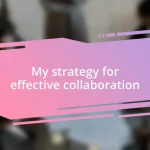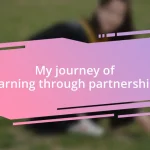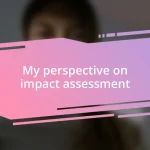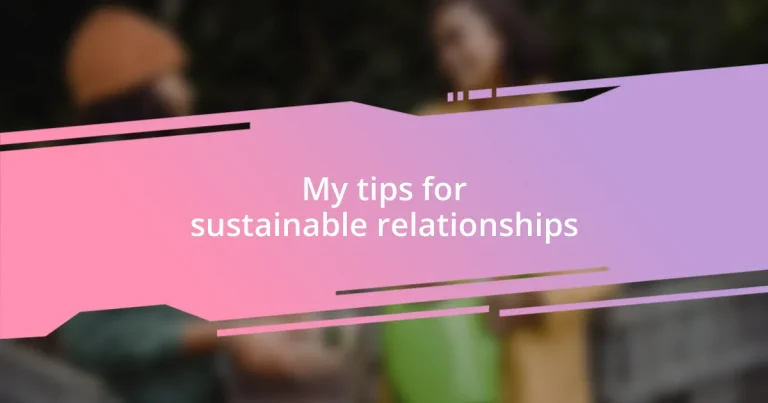Key takeaways:
- Sustainable relationships are founded on mutual respect, empathy, and open communication, enabling personal and joint growth.
- Key qualities for sustainable relationships include honesty, emotional intelligence, and support for each other’s development.
- Effective communication practices, like active listening and using “I” statements, enhance understanding and reduce conflict.
- Practicing gratitude and appreciation fosters deeper connections and helps to balance challenges in relationships.
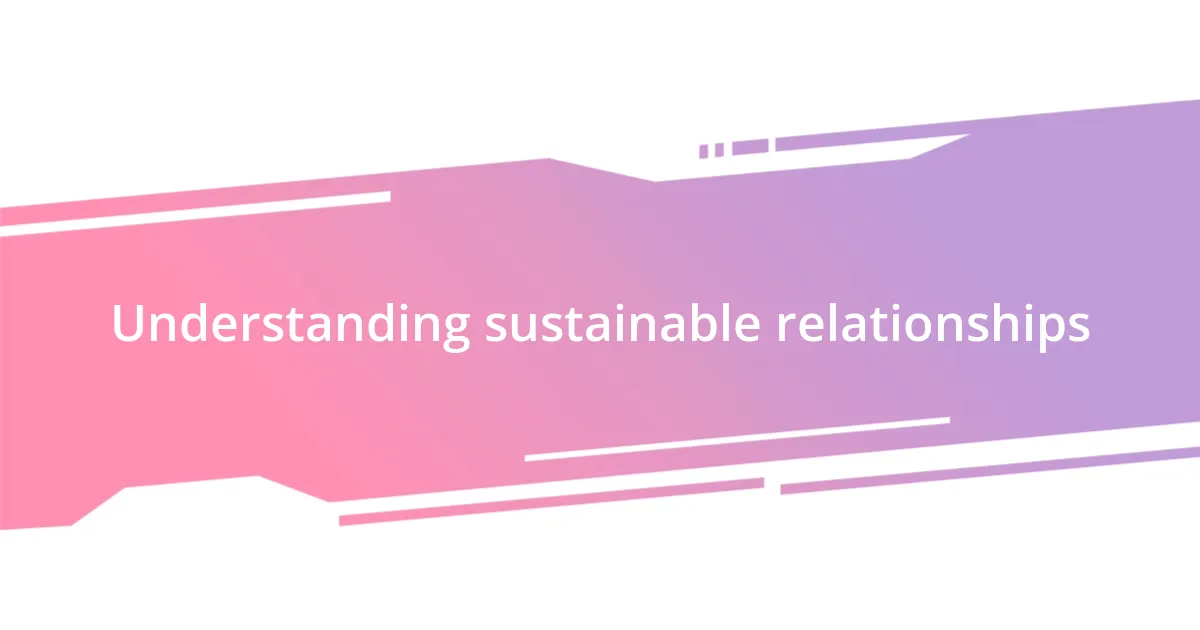
Understanding sustainable relationships
Sustainable relationships are built on a foundation of mutual respect, empathy, and open communication. I remember a time when a small misunderstanding turned into a major conflict simply because we weren’t clear with each other. Have you ever found yourself in a similar situation? It often takes just a simple conversation to uncover the root cause of an issue and strengthen the bond.
At their core, sustainable relationships thrive on the idea of growth—both individually and as partners. I once had a friend who embraced their partner’s desire for personal development wholeheartedly. It reminded me that supporting each other’s goals can lead to a deeper connection. Can we truly be our best selves without encouragement from those closest to us?
Understanding sustainable relationships also means recognizing the importance of resilience. I’ve faced challenges where the easy way out seemed tempting, but choosing to work through difficulties led to stronger ties. Have you ever wondered how lasting partnerships withstand the test of time? It often comes down to a shared commitment to navigate life’s ups and downs together.
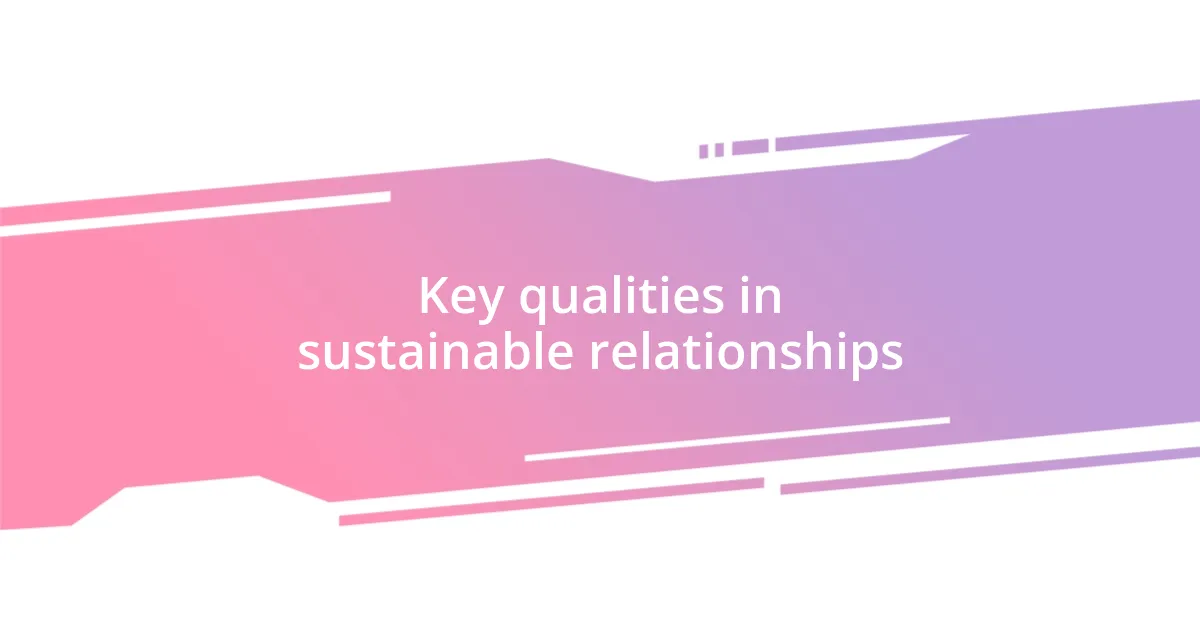
Key qualities in sustainable relationships
In my experience, honesty is a cornerstone of sustainable relationships. When we’re clear about our feelings, it fosters trust. I once found myself tangled in a web of unspoken expectations with a close friend. It was a frustrating time until we finally sat down and shared our true thoughts. That moment of honesty not only removed the tension but also strengthened our bond in ways I hadn’t anticipated.
Another key quality is emotional intelligence. Being able to recognize and respond to each other’s emotions can truly transform a relationship. I remember evenings with my partner where, instead of brushing off a bad day, we’d share our struggles. Those vulnerable moments became the bedrock of our connection, allowing us to support each other authentically. Here’s a quick overview of some essential qualities for sustainable relationships:
- Mutual Respect: Valuing each other’s opinions and feelings.
- Empathy: Understanding and sharing each other’s emotions.
- Open Communication: Expressing thoughts and feelings honestly.
- Trust: Building a reliable foundation through honesty.
- Emotional Intelligence: Recognizing and balancing each other’s feelings.
- Support for Growth: Encouraging personal and mutual development.
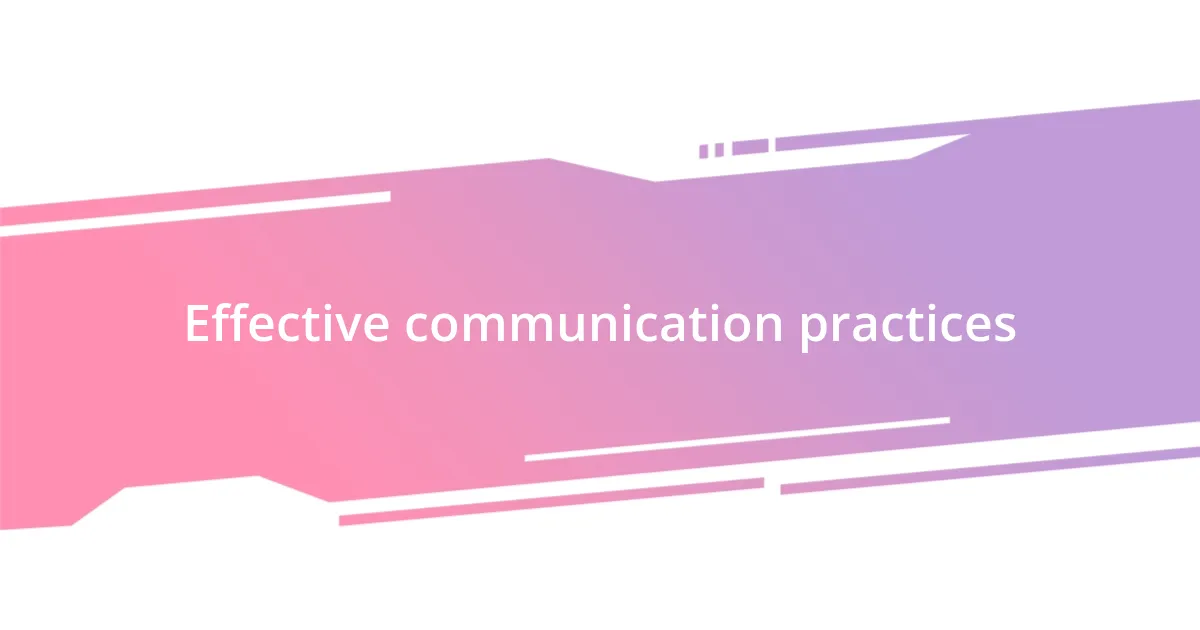
Effective communication practices
Effective communication practices are vital for fostering deeper connections in relationships. One practice I’ve found incredibly useful is active listening. I remember a conversation with a loved one where I made a conscious effort to put away distractions and truly focus on what they were saying. It not only made them feel valued but also deepened my understanding of their perspective. Have you ever considered how much better conversations can be when we genuinely listen?
Another essential practice is expressing feelings using “I” statements. This simple technique transformed how I approach potentially sensitive topics. Instead of saying, “You never listen to me,” I learned to express it as, “I feel unheard when we’re talking, and I’d appreciate your attention.” The difference is astonishing! Being able to communicate my feelings without placing blame allows for more productive discussions. Have you tried this approach during a disagreement?
Lastly, non-verbal communication plays a crucial role. I recall an instance where I was feeling upset but didn’t say a word. My partner noticed my body language and asked if I wanted to talk. It struck me how much our gestures, tone, and even silence can communicate feelings that words sometimes can’t. Being mindful of these cues helps us better understand each other in moments of both joy and conflict.
| Communication Practice | Description |
|---|---|
| Active Listening | Focusing completely on the speaker to understand their message. |
| I Statements | Expressing feelings by focusing on personal experiences rather than accusing others. |
| Non-Verbal Communication | Understanding body language, tone, and gestures to interpret feelings. |
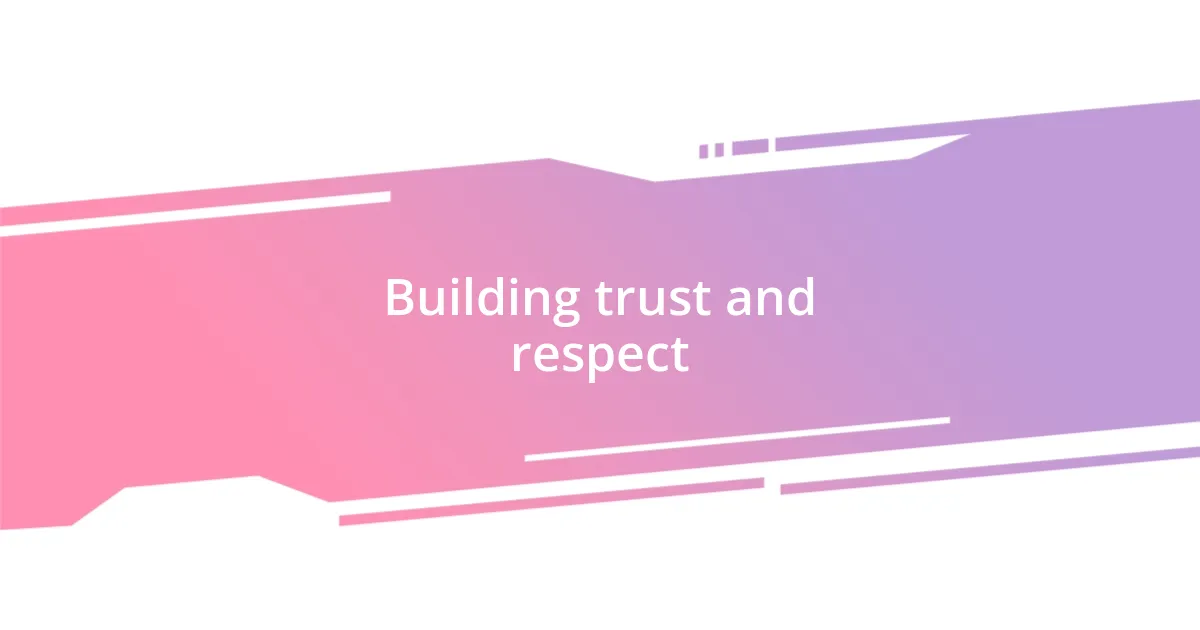
Building trust and respect
Building trust and respect takes time and consistency. I once had a colleague who shared personal stories about his life, and it encouraged me to reciprocate. Those moments created a safe space where we both felt respected, and it reminded me that vulnerability often strengthens trust. Have you ever noticed how opening up can break down barriers in your own relationships?
In my journey, I’ve learned that respecting boundaries is crucial for fostering trust. There were times when I’d push too hard for answers, thinking I was helping. However, I soon realized that a gentle approach was more effective. It’s fascinating how respecting someone’s comfort zone can actually draw them closer. Have you experienced the power of patience with someone you care about?
Additionally, I believe that small acts of honesty can accumulate into a robust foundation of trust. I remember when a friend confided in me about a mistake they made. Instead of judging, I offered support and shared my own similar experiences. That moment not only deepened our connection but also taught me that acceptance plays a vital role in respect. What small action can you take today to build trust in your relationships?
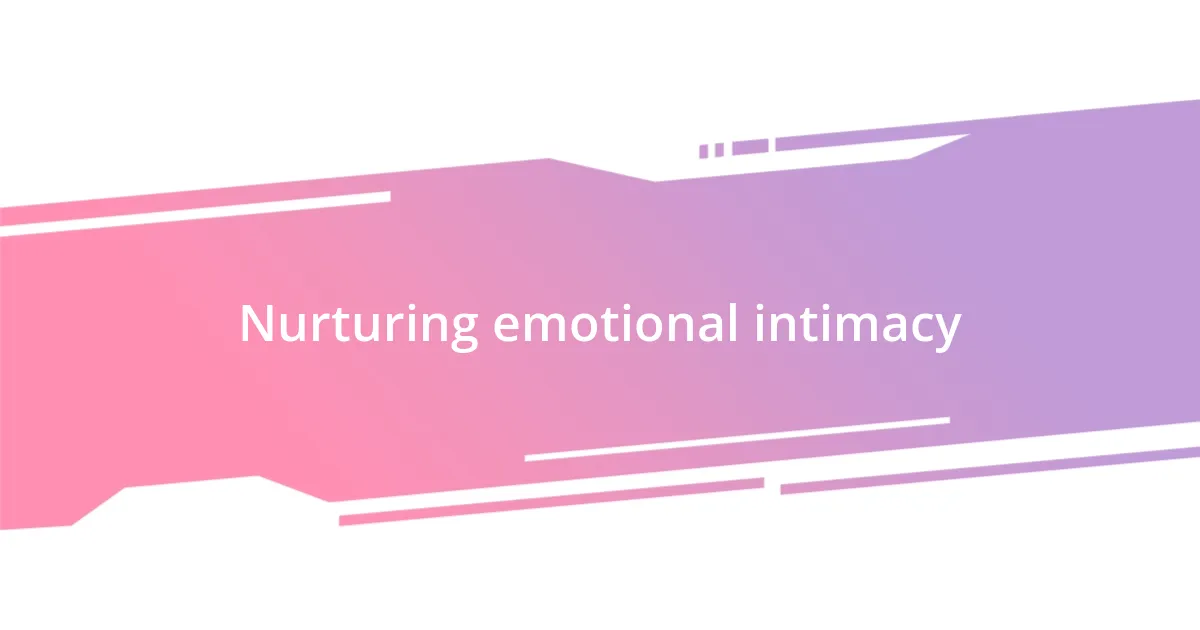
Nurturing emotional intimacy
Nurturing emotional intimacy is all about connection on a deeper level. I remember a time when my partner and I decided to set aside a regular “date night” just for open conversations. It might seem simple, but having a dedicated time to share our thoughts and feelings really drew us closer together. When was the last time you created space for an open heart-to-heart?
Another strategy I use is sharing personal stories, including my fears and dreams. Recently, I told my partner about my childhood struggles, and their understanding helped me feel lighter. This act fostered a sense of safety between us, allowing emotional intimacy to grow. Have you ever considered how sharing your own vulnerabilities can open the door for someone else to do the same?
Moreover, physical touch, like holding hands or a warm hug, plays a crucial role in creating emotional closeness. I often find that a simple touch communicates what words sometimes can’t, transforming moments of stress or disagreement into opportunities for connection. It’s truly remarkable how a gentle gesture can nurture a sense of emotional safety. When was the last time you experienced the power of a comforting touch?
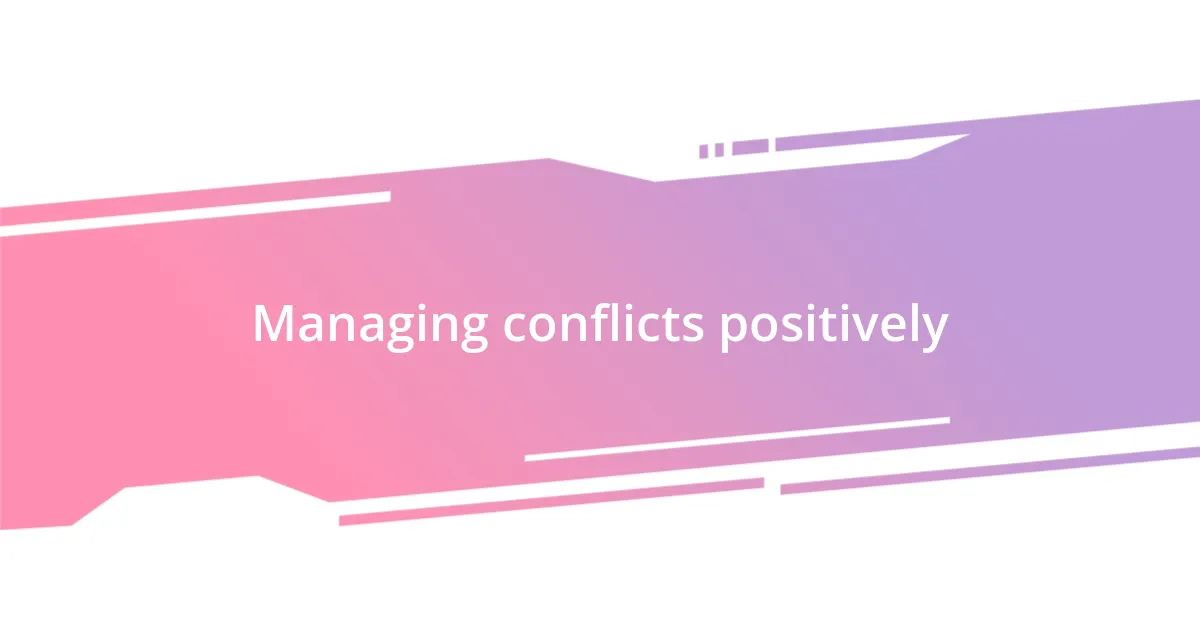
Managing conflicts positively
Managing conflicts positively is essential for maintaining healthy relationships. I recall a tense moment with a friend where we disagreed on a project. Instead of raising my voice or shutting down, I took a deep breath and chose to listen to their perspective first. That simple act transformed the conversation; it made me realize how important it is to approach conflict with an open mind. Have you ever found that listening first can change the entire tone of a disagreement?
Another technique I often use is reframing negative statements into constructive feedback. There was a time when my partner and I had a disagreement about planning a trip. Instead of saying, “You never listen,” I framed it as, “I feel overwhelmed when our plans keep changing.” This shift not only made my feelings clear but also invited a more compassionate dialogue. How can you rephrase your concerns in a way that fosters understanding rather than defensiveness?
Finally, I believe in the power of taking breaks during heated discussions. During one argument with a family member, I could feel the tension escalating. I suggested we pause and return to the conversation later. When we reconvened, we both came back calmer and more capable of discussing our feelings without anger clouding our judgment. Have you ever noticed how stepping away can lead to more productive conversations? This approach has been a game-changer in my own relationships.
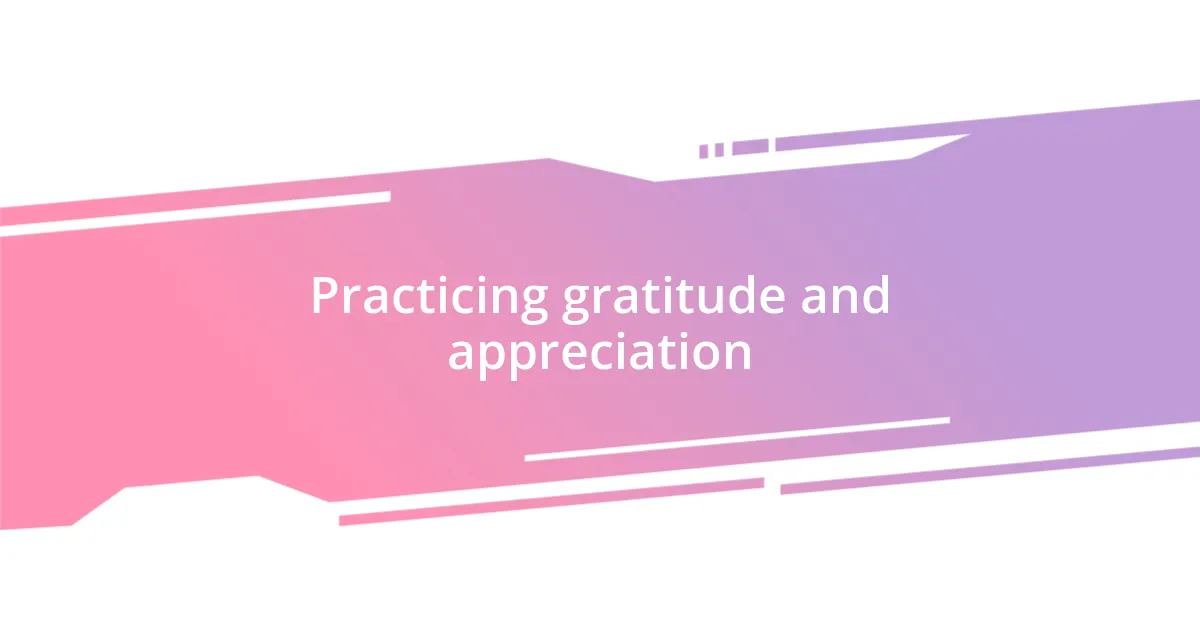
Practicing gratitude and appreciation
Practicing gratitude and appreciation is a cornerstone of any lasting relationship. I often find myself jotting down little notes of thanks to my partner; it could be for something as small as making coffee in the morning or as significant as their unwavering support during a tough week. A few weeks ago, I surprised my partner with a sticky note on the bathroom mirror that read, “Thank you for being my rock.” The smile that lit up their face made me realize how powerful these simple expressions can be. Have you ever thought about how a small note can brighten someone’s day?
In my experience, expressing appreciation regularly shifts the atmosphere in my relationships. When I tell my best friend how much I value our long talks that stretch into the night, it reinforces our bond and makes both of us feel seen. Not long ago, I took the time to write her a heartfelt message, and she responded with her own list of reasons she cherishes our friendship. It sparked an enriching conversation, reminding me of the importance of reciprocated gratitude. When was the last time you shared the reasons you appreciate someone close to you?
Moreover, I believe gratitude helps us both acknowledge the positives and counterbalance challenges. After a particularly rough patch with my sibling, we decided to write down three things we appreciated about each other. It felt empowering to shift the focus from grievances to gratitude, allowing us to reconnect on a deeper level. It made me wonder: how often do we let the good fade into the background while fixating on the bad? Embracing appreciation can dramatically alter how we perceive and interact with our loved ones.







